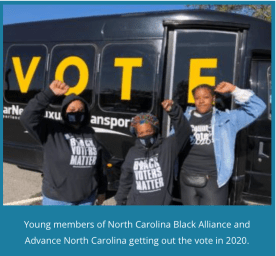The most impacting liberation has always been collective and grassroots. North Carolina Black Alliance is one such collective effort that his grown tremendously in power and impact over its lifespan. Below is a reflection on the history of such movements in North Carolina and how collective, grassroots organizing is more important than ever.
 Really Becoming America
Really Becoming America
By North Carolina Black Alliance staff
A NATION ON THE VERGE OF BECOMING
Increased attacks on voting rights, ramped up gerrymandering, the January 6th insurrection, and the endless stream of videos of unarmed Black and Brown men and women killed in unjustified police shootings make us question who and what America is.
A common sentiment is that these assaults are merely an unmasking of the systemic racism and oppression that has always existed beneath our nation’s surface.

 Minding the Gap
Minding the Gap We Lived Happily During the War
We Lived Happily During the War A Little More Than Kin
A Little More Than Kin
You must be logged in to post a comment.